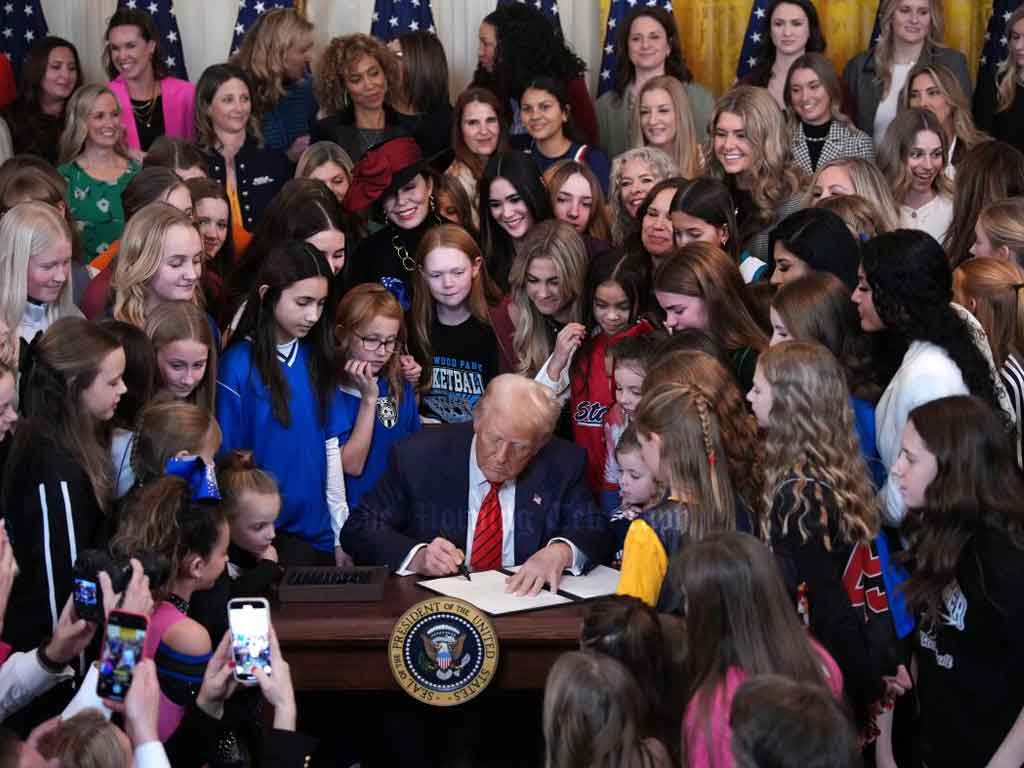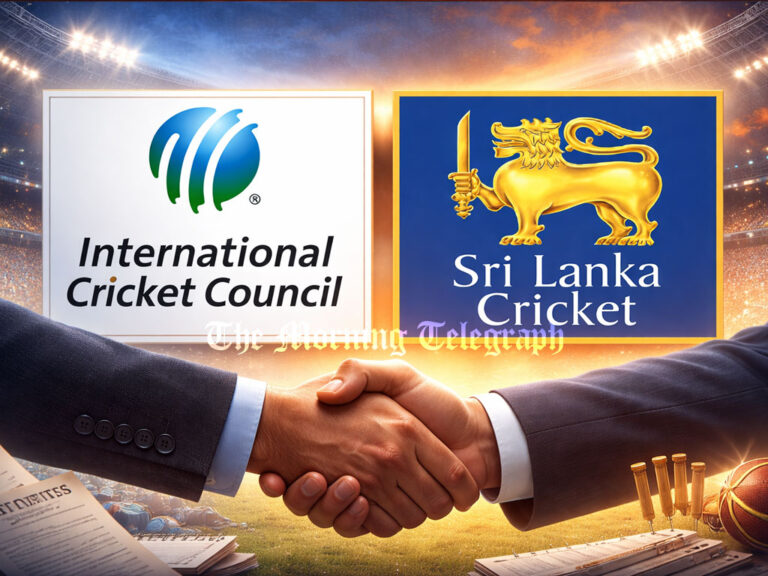
President Donald Trump signed an executive order on Wednesday prohibiting transgender women and girls from competing in female sports. The measure, titled the “No Men in Women’s Sports Executive Order,” is the fourth executive order targeting transgender people that Trump has signed since taking office on January 20.
Speaking from a podium at the White House, with dozens of women and girls standing behind him, Trump declared that the executive order was necessary to protect women’s sports from what he called radical leftist ideology.
“The radical left has waged an all-out campaign to erase the very concept of biological sex and replace it with a militant transgender ideology,” Trump said. “With this executive order, the war on women’s sports is over.”
Trump cited several examples of what he called “men claiming to be girls” stealing victories, including the widely debated case of Algerian female boxer Imane Khelif, who was barred from competing in the Paris Olympics over gender eligibility concerns. Trump, however, falsely claimed that Khelif was assigned male at birth, a claim that has been publicly refuted.
What the Executive Order Does
White House officials said in a press call on Wednesday morning that the executive order will implement two key policies to enforce the ban on transgender women in women’s sports.
First, the order will reverse the Biden administration’s Title IX guidance, which previously required schools receiving federal funding to allow transgender students to compete in sports aligned with their gender identity. Under Trump’s executive order, students assigned male at birth will be barred from participating in girls’ and women’s sports. The Education Department will be responsible for investigating violations, and officials stated they would actively seek cases for review. The new rule will also restrict transgender women from using women’s restrooms and other gender-segregated facilities in schools.
Second, the administration plans to work with sports governing bodies, including the International Olympic Committee (IOC), to enforce these policies in non-educational settings. The order also extends to visa policies, meaning that foreign athletes competing in women’s sports in the U.S. may have their gender identity reviewed as part of fraud prevention measures.
“If you are coming into the country and claiming that you are a woman but are a male here to compete against women, we’re going to be reviewing that for fraud,” a White House official stated.
The timing of the “No Men in Women’s Sports Executive Order” coincides with the 39th annual National Girls & Women in Sports Day, an event first established in 1987 to celebrate female athletes and inspire young girls to participate in sports.
Political and Public Reaction
The issue of transgender women in sports has been one of the most divisive topics in American politics, especially leading up to the November election. Trump repeatedly criticized the inclusion of trans athletes in women’s sports, referring to trans women as “men” and promising to ban their participation.
A Gallup poll from May 2023 showed that nearly 70% of Americans believe transgender athletes should only compete on teams that correspond with their birth sex, a rise from 62% in 2021. According to the Movement Advancement Project, an LGBTQ think tank, 27 states already have laws, regulations, or policies banning transgender students from participating in sports consistent with their gender identity.
Support and Opposition
The executive order has drawn both praise and criticism from various groups.
Schuyler Bailar, a former Harvard University swimmer and the first openly transgender athlete to compete in Division I men’s sports, condemned the order, calling it “absolutely devastating” and a direct attack on transgender rights.
“This is a really horrible way to invite a lot of discrimination — not just against trans people but also against all people in the women’s category, because this is a policing of women’s bodies in sports,” Bailar, 28, said.
On the other hand, Riley Gaines, a former college swimmer who has been a vocal opponent of trans women competing in women’s sports, praised the order. Gaines, who attended the signing ceremony, wrote on X (formerly Twitter):
“Things could’ve been so different. Gender insanity was the final straw that brought a lot of moderates to the side of common sense. Specifically, I believe it was the issue of men in women’s sports. I’ve been living in a state of gratitude every day since Nov 5th. Praise God.”
Several LGBTQ rights organizations have strongly opposed the executive order. Carl Charles, a senior attorney for Lambda Legal, calleda it “appalling and discriminatory.”
“We are appalled, and in fact disgusted, at this administration’s insatiable appetite for fearmongering about and relentless targeting of this most vulnerable population,” Charles said. He added that many states with trans athlete bans are already facing lawsuits, and courts have blocked similar laws in Arizona, Idaho, Utah, and West Virginia.
Trump’s Broader Policies Targeting Transgender People
The sports ban is the faourth executive order Trump has signed targeting transgender people since his return to office.
On Inauguration Day, Trump signed an order stating that the U.S. government would recognize only two sexes—male and female—and that these sexes “are not changeable.”
He also signed an order reinstating a ban on transgender people serving openly in the U.S. military and restricting access to gender-affirming medical care for transgender individuals under 19 years old nationwide.
Legal Challenges Expected
Like many state-level bans on trans athletes, the executive order is expected to face legal challenges. Several federal courts have ruled against similar policies, and legal experts argue that the order may violate Title IX’s broader protections against sex-based discrimination.
Despite the likelihood of legal battles, Trump has made it clear that he sees transgender issues as a key part of his political agenda. As the November election approaches, the debate over transgender rights—especially in sports, healthcare, and the military—is expected to remain at the center of national discourse.




